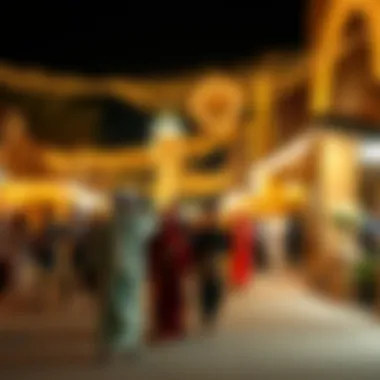Public Holidays in the UAE: A Comprehensive Guide


Intro
The UAE is a remarkable tapestry of cultures, traditions, and modern marvels. Amidst the shimmering skyline of Dubai and the serene sands of Abu Dhabi lies an array of public holidays that reflect both the nation’s rich heritage and its aspirations for the future. Understanding these holidays isn’t just about marking dates on a calendar; it’s about grasping how they influence everyday life, tourism, and real estate in this vibrant region.
Overview of Public Holidays
Public holidays in the UAE are not merely days off work; they symbolize the core values and collective memory of a nation. They anchor communities, providing opportunities for families to connect, and for tourists to engage with local customs. With most holidays rooted in Islamic traditions or historical events, these celebrations weave together a narrative that shapes the country’s identity.
In this guide, we will delve into:
- The important dates and what they signify.
- Cultural and social implications, reflecting the UAE's melting pot of cultures.
- The legal framework surrounding these holidays, which governs how they affect work and daily life.
- The interrelation of public holidays with tourism and real estate, offering insights into market trends and investment opportunities.
Time-honored festivities, like Eid al-Fitr and National Day, resonate deeply with residents, showcasing a blend of joy and reverence. Understanding these elements is essential not only for investors and real estate developers but for anyone wishing to navigate life in the UAE smoothly.
As we explore further, it becomes clear that public holidays are pivotal in shaping the socio-economic landscape of the Emirate, opening doors to unique investment opportunities and influencing market dynamics.
Overview of Public Holidays in the UAE
Public holidays in the United Arab Emirates are more than just days off from work; they serve a multifaceted purpose that reflects the rich tapestry of the nation’s cultural and religious heritage. Understanding these holidays provides an important lens into the local lifestyle, values, and social practices that shape everyday life in the UAE. This section of the article aims to shed light on the significance of public holidays, explore the various types of celebrations observed, and discuss how these days influence both cultural identity and economic activities.
Preface to Public Holidays
In the UAE, public holidays are officially declared by the government, typically aligning with significant Islamic events or national milestones. The calendar is marked by a variety of occasions, from religious observances like Eid al-Fitr and Eid al-Adha to the celebration of National Day on December 2. These days are not just marked on the calendar; they evoke a profound sense of community and belonging among citizens and expatriates alike. It’s during these holidays that the spirit of hospitality shines through, as families and friends gather to celebrate with feasts, fireworks, and cultural events.
Furthermore, the impacts of public holidays stretch far beyond social gatherings and festivities. They also have a pronounced effect on economic activities, tourism, and even travel plans within the region. Understanding the nuances of how these holidays function can provide useful insights for investors, real estate developers, and businesses looking to harness the potential of festive seasons.
Cultural Significance of Holidays
The public holidays observed in the UAE are steeped in cultural significance. They reflect both Islamic traditions and local customs that various communities uphold. For instance, Eid al-Fitr, which marks the end of Ramadan, is characterized by communal prayers, the giving of Zakat al-Fitr, and joyous family gatherings that strengthen social bonds. The meaning attached to these holidays transcends mere observances; they are occasions for reflection, gratitude, and community engagement.
Moreover, the festive atmosphere during these holidays stimulates a palpable sense of unity among diverse populations living in the UAE, from Emiratis to expatriates. There’s an influx of activities—ranging from traditional music performances to exhibitions showcasing the UAE’s rich heritage—that invites participation from all walks of life. It’s not uncommon to find streets adorned with lights and signs of celebration, fostering an inclusive environment where various cultural expressions are honored.
"Public holidays are a reflection of the values that shape society. They are moments when people converge to celebrate shared beliefs and history."
In essence, public holidays in the UAE serve as both a celebration of identity and an opportunity for economic participation. They provide real estate agents, investors, and businesses with insight into consumer behavior and trends, particularly during peak holiday seasons when travel and spending are typically elevated.
By engaging with and understanding these holidays, stakeholders can tailor their approaches to align with the cultural values and lifestyles of the population, potentially unlocking new avenues for growth and connection within this fascinating region.
Official Public Holidays
Public holidays in the UAE are significant not just for their festive nature but also for how they shape various aspects of life, from culture to business operations. Each holiday on the calendar brings with it a set of traditions and cultural practices that reflect the values of the Emirati society. Additionally, these days off are crucial for economic activities, influencing everything from retail operations to tourism dynamics. The hours spent away from work offer citizens and residents alike time to engage with their families and communities, fostering a sense of social cohesion. In the context of real estate, understanding these holidays can aid investors and buyers in making informed decisions, as the market responds differently during these periods.
Eid al-Fitr
Eid al-Fitr marks the end of Ramadan, the holy month of fasting. This holiday is highly anticipated and is considered a time for celebration and gratitude. Families come together to enjoy lavish meals, and it’s common to see streets adorned with lights and decorations. The essence of Eid al-Fitr lies in the spirit of giving; Zakat al-Fitr, a form of charity, is given before the Eid prayer, ensuring that everyone can partake in the festivities, regardless of their financial situation.


Businesses often see an uptick during this period as people indulge in shopping sprees for new clothes and gifts. For those in the real estate sector, Eid al-Fitr may offer unique opportunities. Many families may consider moving or renting new homes during this time, driven by a fresh start associated with the holiday.
Eid al-Adha
Eid al-Adha holds immense significance as it commemorates the willingness of Ibrahim to sacrifice his son in obedience to God. The day is marked by the ritual of Qurbani, where animals are sacrificed, and their meat is distributed among family, friends, and the less fortunate. This beautiful practice reinforces community bonds and highlights the values of generosity and sharing.
From an economic standpoint, Eid al-Adha can be quite impactful. Travel spikes as people head to their hometowns or embark on pilgrimages to Mecca, which adds to the bustling atmosphere. For real estate professionals, the increased localization of certain communities during this holiday might present insights into emerging neighborhood desirabilities. Investors who tap into these dynamics can better cater to renters or buyers looking for properties that suit their needs during this holiday season.
National Day
Celebrated on the 2nd of December, National Day is a hallmark occasion in the UAE, commemorating the union of the seven emirates. This day is colored with national pride, parades, and fireworks. The atmosphere is electric as people wear traditional dress and display flags, reflecting their allegiance to the nation.
This holiday is more than just a day off; it is a celebration of identity and culture. For real estate agents and developers, this time is essential for gauging the sentiment of residents towards various developments. National Day often sees a spike in tourism as visitors are drawn in by the patriotism and celebrations, which can lead to a promising rental market for those in the hospitality sector.
Islamic New Year
The Islamic New Year is not as widely celebrated as other holidays, but it still holds its place on the calendar as a time for reflection and prayer. It marks the beginning of the new Islamic lunar calendar and sees many people engaging in personal or family spiritual practices.
In a business context, this holiday can be quieter than others, which might affect transactions and investments in the real estate market. However, understanding its timing and implications can allow investors to prepare strategically for transactions that thrive during more bustling holiday periods. For those looking to buy or rent, acknowledging the timing of the Islamic New Year can be useful in planning your approach to the market.
Holiday Dates and Variability
Understanding the variability of holiday dates in the UAE holds great importance for several reasons. Not only do these dates shape the yearly calendar for business and personal activities; they also reflect the unique blend of tradition and modern influences that characterize the Emirates. Moreover, for real estate agents, investors, and developers, being aware of these dates can aid in planning schedules, marketing strategies, and investment activities. The variability of holiday dates is primarily due to the lunar Islamic calendar, which might affect operational schedules throughout the year.
Shifting Dates of Islamic Holidays
Islamic holidays, like Eid al-Fitr and Eid al-Adha, don’t have fixed dates on the Gregorian calendar. Instead, they shift based on the moon's sighting, leading to variability that can catch many by surprise. For instance, Eid al-Fitr, marking the end of Ramadan, can be celebrated on different days depending on local moon sightings. This element of unpredictability renders it crucial to stay informed.
- With each year, the Islamic calendar lags behind the Gregorian calendar by about 10 or 11 days.
- Real estate projects and rental agreements may be affected, as holidays can influence both availability and demand in the housing market. For example, a family looking to move might consider avoiding shifts around Eid to enhance their experience.
Real estate professionals can benefit significantly from this knowledge. They can strategize around holiday periods to optimize lease agreements, viewings, and other transactional processes. Moreover, community events surrounding holidays can also provide opportunities for property showcases and open houses, further emphasizing why these shifting dates merit attention.
Announcement of Dates
The announcement of holiday dates occurs through official channels, including government statements and local news outlets. The precision in declaring these dates can aid individuals and businesses in organizing their activities. Clarity and timeliness are essential as they allow families and organizations to adequately prepare for the celebrations.
- Key organizations: The UAE government often consults astronomical calculations and religious authorities to make announcements. This coordination adds a layer of reliability to the information.
- It's wise to keep an eye on news platforms such as WAM or local media, where confirmations are published close to the holiday period.
For investors and agents, staying updated ensures adaptability and allows for smarter business decisions around these peak periods of activity. Not only can they align their marketing strategies to coincide with the excitement of the holidays, but they can also ensure their clients feel supported during these culturally significant times.
"Awareness of shifting holiday dates provides a strategic advantage for industry professionals, enabling tailored services and timely communications with clients."
In summary, holiday dates and their variability are more than mere calendar notations; they influence the economic landscape and invite opportunities for engagement in the real estate sector. By embracing this understanding, professionals can navigate the rhythms of the UAE lifestyle effectively.
Economic and Social Impacts
Understanding the economic and social impacts of public holidays in the UAE provides significant insights into how these days affect various sectors and the overall lifestyle of residents. These holidays serve not just as days of rest and celebration, but also as pivotal moments that can shift market dynamics and open up avenues for social interaction. The impact is multifaceted, affecting everything from business operations to tourism, ultimately shaping the fabric of society.


Influence on Business Operations
Public holidays in the UAE often lead to a temporary halt in business activities. Companies must navigate these interruptions thoughtfully to mitigate negative effects on productivity and revenue. Most businesses, especially in sectors like retail and hospitality, prepare well in advance for these periods.
- Sales and Promotions: It’s common for stores to launch sales during holidays like Eid al-Fitr and National Day. This strategic approach not only boosts sales revenue but also enhances customer engagement.
- Workforce Management: Businesses tend to adjust their workforce structures, offering flexible hours or temporary hires to cover the surges in demand during holiday periods. Managing holiday pay and leave becomes crucial to ensure employee satisfaction and loyalty.
- Operational Costs: Certain sectors experience an increase in operational costs, due to higher wages for holiday workers or logistics challenges in maintaining supplies during these busy periods.
Given these factors, a well-planned strategy for public holidays can lead to an uplift in overall business performance.
"Understanding the nuances of public holidays can mean the difference between a thriving business and one that struggles to keep its head above water."
Travel and Tourism Dynamics
Travel and tourism are significantly influenced by public holidays in the UAE. As the country attracts millions of visitors each year, holidays present opportunities for the tourism industry to flourish.
- Increased Visitor Numbers: Holidays result in a spike in both international and domestic tourism. Many expatriates take this time to travel, while tourists flock to the UAE to partake in the unique celebrations and events held during these festive times.
- Cultural Experiences: Visitors are drawn to various cultural events and activities related to the holidays. Attractions, such as the Sheikh Mohammed Centre for Cultural Understanding, often host events to educate tourists about local customs and traditions.
- Economic Injection: The influx of tourists leads to added revenue for local businesses, hotels, restaurants, and entertainment venues. This boost contributes to the overall economic landscape, reflecting the importance of public holidays as economic drivers.
Celebrations and Traditions
Public holidays in the UAE are more than just days off from work; they represent a rich tapestry of cultural practices and community gatherings that resonate deeply with the spirit of the nation. These celebrations offer a glimpse into the values and traditions of Emirati society, reflecting both a reverence for heritage and an embrace of modernity. By delving into the way these holidays are celebrated, one can appreciate their significance, not just as festive occasions but as vital moments of social cohesion and identity.
How Public Holidays are Celebrated
During public holidays, the UAE transforms into a vibrant hub of activity marked by various celebrations that integrate traditional customs with contemporary festivities. The observance begins well before the actual holidays, as families prepare by cleaning their homes and paying off debts to ensure a fresh start. Storefronts are adorned with lights and decorations that create a festive atmosphere, setting the tone for the days to come.
For instance, Eid al-Fitr, which celebrates the end of Ramadan, typically involves special prayers in mosques where large crowds gather early in the day. After prayers, it’s customary to visit relatives and friends, exchanging gifts and treats, embodying the spirit of generosity. Eid al-Adha follows a similar pattern but also includes the significant act of Qurbani, or sacrificial rites, where families donate meat to those in need, promoting compassion and charity.
There’s also a strong emphasis on communal meals, where traditional dishes like mashbak and hummus are served, creating a sense of connection among families and neighbors. These gatherings not only reinforce familial bonds but also build bridges between different cultures residing in the UAE.
Community Gatherings and Events
Community gatherings during public holidays in the UAE are a canvas of shared experiences and cultural expressions. These events often include:
- Fireworks Displays: Particularly prominent on National Day, these splashes of color in the night sky symbolize celebration and unity, attracting families and tourists alike.
- Parades and Festivals: The streets come alive with parades showcasing traditional attire, music, and dance, creating a lively atmosphere that envelops the entire community. In Dubai, for example, the “Dubai Shopping Festival” often coincides with public holidays, drawing massive crowds for shopping and entertainment.
- Cultural Performances: Local artisans frequently display traditional crafts and poetry, allowing for a deeper understanding of Emirati culture.
"Public holidays not only offer a pause in daily life but weave a narrative of unity and shared history.”
Engaging in these events fosters inclusion, as individuals from various backgrounds come together to participate in age-old customs and contemporary festivities alike. The focus on community during these holidays is one of the core reasons why public holidays hold such a significant space in the hearts of those living in the UAE, linking residents to their heritage while honoring the diverse society that flourishes within the nation.
Integration with Dubai Real Estate Market
Understanding the connection between public holidays and the Dubai real estate market is crucial for various players in the real estate field, including agents, investors, buyers, and developers. The way holidays influence the market can be the difference between a thriving business year and a struggle to close deals. Several factors interplay here, shaping buying patterns, investment decisions, and even property values.
Public holidays are not just markers of time; they can alter the dynamics of real estate transactions significantly. During festive seasons, many families are on the lookout for new homes, making property viewings and open houses more frequent. This increase in foot traffic around the holidays can be quite beneficial for real estate agents trying to close sales.
Holiday Influence on Property Transactions
Consider the scenario during Eid al-Fitr, one of the largest holidays in the UAE. This celebration often sees an influx of expatriates returning to the country. They might be in the market for new homes in Dubai or looking to invest in properties as a means of securing stable returns. Agents who understand this trend can tailor their strategies, highlighting properties suited for families and individual buyers alike.


Here are a few ways holidays impact property transactions:
- Increased Demand: The celebratory atmosphere makes buyers more inclined to purchase properties.
- Time to Reflect: Many people think about their living situations during holidays, prompting decisions about moving or investing.
- Networking Opportunities: Festive gatherings create environments for networking, leading to potential partnerships.
The results of these transactions are often seen right after holidays, where a flurry of deals can elevate or stabilize property prices in certain areas. Real estate agents must prepare for these shifts, leveraging insights from previous holiday seasons to forecast demand.
Seasonality in Real Estate Investment
In the realm of real estate, seasonality cannot be overlooked, especially in a vibrant market like Dubai. Identifying when public holidays occur can profoundly influence an investor’s strategy, shaping their approach according to the seasonal behaviors of buyers and renters.
- Summer Slump: Many families travel abroad during the summer holidays, leading to lower engagement in the property market. This trend is vital to watch for investors who might consider off-peak pricing as an advantageous opportunity.
- Investment Hotspot: Conversely, post-holiday periods often see a surge in property investment as people return and begin to settle into routines. As schools resume and businesses stabilize, buyers and renters appear more decisively in the market.
- Cultural Considerations: Each holiday has its cultural weight that brings out different kinds of buyers. For example, during National Day, there’s often a wave of national pride that encourages local buyers to invest in properties as part of nation-building enthusiasm.
In a nutshell, aligning one's investment strategy with the public holiday calendar proves beneficial. Each holiday presents a unique opportunity, but proper analysis and understanding of consumer behavior are essential for maximizing potential returns.
Legal Aspects of Public Holidays
Understanding the legal aspects of public holidays in the UAE is essential for anyone engaged in the real estate market or any business operations within the country. These holidays not only affect work schedules but also have implications for employee rights and regulatory compliance. Recognizing these factors helps ensure smooth business functioning while respecting the cultural norms central to the UAE’s identity. The regulations associated with public holidays are essential for fostering an equitable working environment and for understanding the duties and rights of both employers and employees.
Regulatory Framework
The regulatory framework surrounding public holidays in the UAE is primarily governed by the UAE Labor Law. This law delineates how public holidays are to be recognized, the rights of employees during these days, and the stipulations for employers. It is vital for both parties to comprehend these regulations to maintain harmony within the workplace.
- Public Holiday Recognition: The UAE recognizes certain Islamic holidays along with National Day as official public holidays. The law states that if a holiday falls on a weekend, the following working day may become a holiday, ensuring that workers do not miss out on their well-deserved time off.
- Duration and Pay: Employees are entitled to a full day’s pay when they take a public holiday off work. However, if a holiday coincides with a day that an employee is mandated to work, such as in the case of shift workers, they are compensated for the day plus additional remuneration as stipulated in Article 81 of the UAE Labor Law.
- Emergency Exceptions: In certain urgent situations, such as natural disasters or national emergencies, regulations permit businesses to adjust holiday observances. This ensures that while cultural norms are respected, essential services can continue to operate.
These regulations ensure fair treatment in the workplace, promoting inclusivity and respect for public holidays.
Employee Rights During Holidays
While public holidays are a time for celebration, they also come with specific employee rights that help safeguard workers' interests. Grasping these rights is vital for both employees and employers to navigate the potentially complex terrain of labor relations.
- Right to Time Off: Employees have the legitimate right to enjoy annual public holidays without discrimination. Employers must provide time off without any retaliation for those who wish to celebrate culturally significant events.
- Compensatory Leave: If an employee is required to work on a public holiday, they are entitled to compensatory leave or additional pay. This encourages companies to respect the time-off needs of their employees while balancing operational requirements.
- Job Protection: During public holidays, job security is maintained. Employees cannot lose their employment status for not turning up on public holidays, which fosters a stable working environment.
"Understanding your rights during public holidays is as crucial as knowing how to celebrate them". This notion resonates particularly in the UAE, where the blend of cultural respect and regulatory compliance defines the workplace landscape.
In summary, navigating the legal aspects of public holidays involves being aware of how regulations affect employee rights and corporate responsibilities. For real estate agents, investors, and business leaders, this understanding minimizes potential conflicts and enhances overall operational efficiency during these culturally rich times.
Ending and Future Outlook
As the UAE continues to grow and evolve, the landscape of public holidays plays a vital role in shaping both cultural appreciation and economic activities. The observance of holidays is not merely a day off work; it reflects the values, traditions, and aspirations of Emirati society. Analyzing holidays allows us to understand deeper connections among communities, as these occasions foster unity and shared identity among diverse populations.
Summary of Findings
Throughout this article, we have explored the significance of public holidays in the UAE, highlighting not only their religious and cultural aspects but also how they influence various sectors such as tourism and real estate.
- Cultural Significance: Each public holiday encapsulates rich traditions that resonate with the UAE’s heritage and social values, from the spirited festivities of Eid to the national pride felt on National Day.
- Economic Impact: Public holidays often trigger a surge in tourism and local spending, leading to bustling marketplaces and events that create a festive atmosphere. The ripple effect can be seen in the real estate sector as well, where holiday periods may cause fluctuations in property transactions.
- Legal Aspects: Understanding the regulations around these holidays can help both employers and employees navigate their rights, ensuring a fair balance for all parties involved.
Recognizing these elements, stakeholders, particularly in real estate, have a wealth of opportunities to align strategic planning with the public holiday calendar, maximizing engagement and investment potential.
Potential Changes in Public Holiday Structure
Looking forward, several considerations guide potential evolutions in the public holiday structure within the UAE. The changing dynamics of society and the economy suggest several possibilities:
- Adjustment of Dates: With the diverse nature of the UAE's demographics, there could be a move toward creating or adjusting holidays to better reflect and celebrate its multicultural society.
- Increased Flexibility: Employers may adopt more flexible options regarding holiday observance, offering employees a choice in how they spend their leave days. This could enhance work-life balance and overall satisfaction in the workforce.
- Digital Celebrations: As technology plays an increasingly pivotal role in our lives, future celebrations may incorporate more virtual platforms, ensuring that public holidays reach individuals who may not physically participate.







